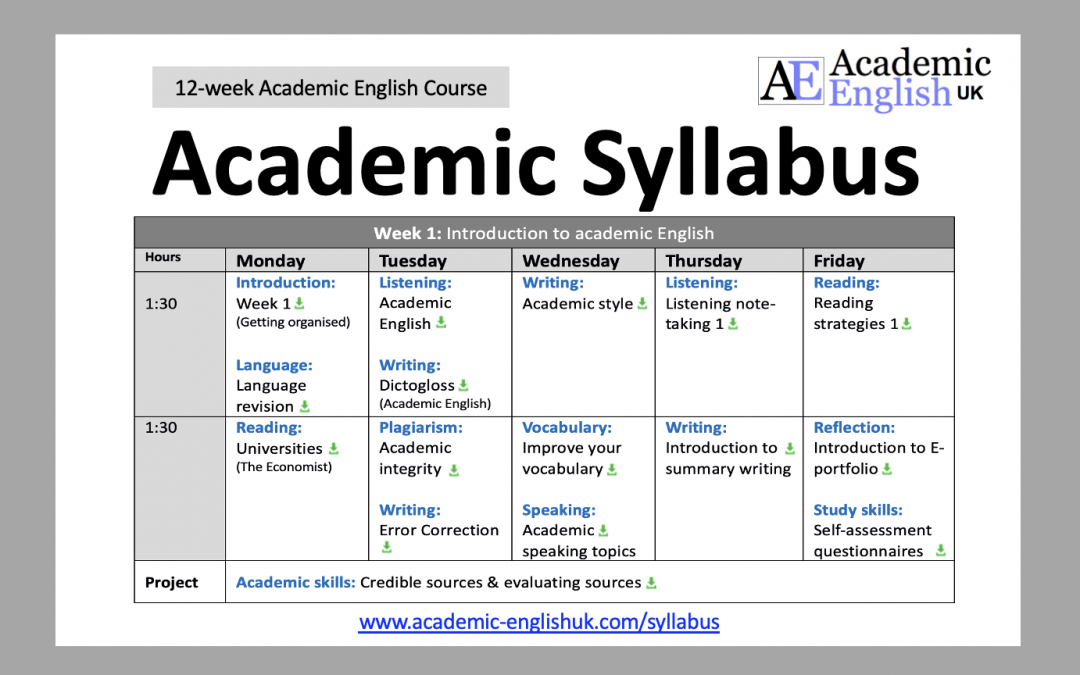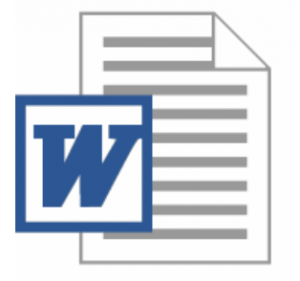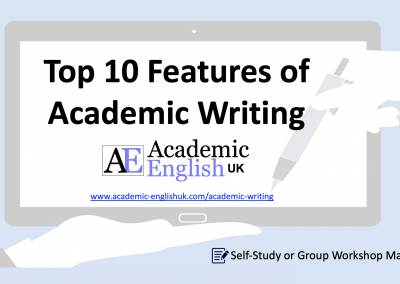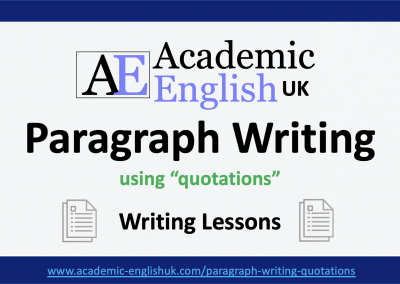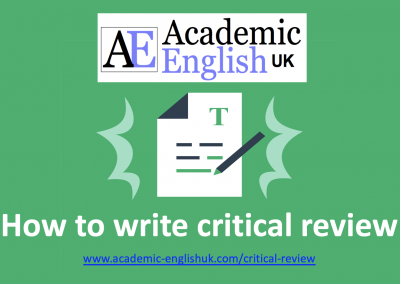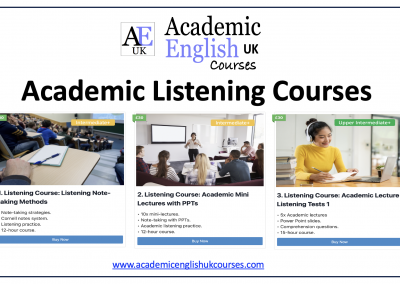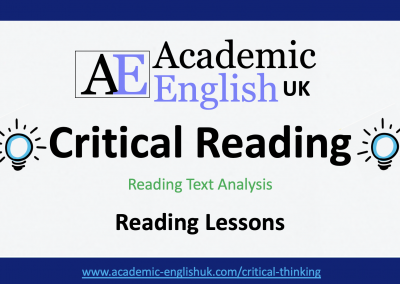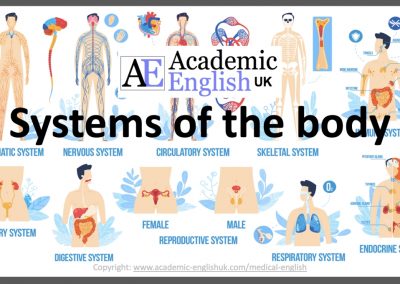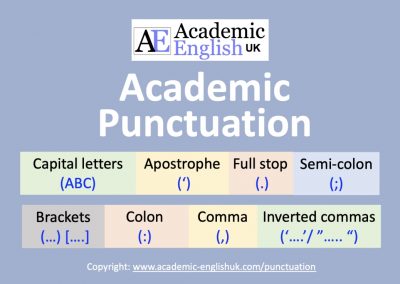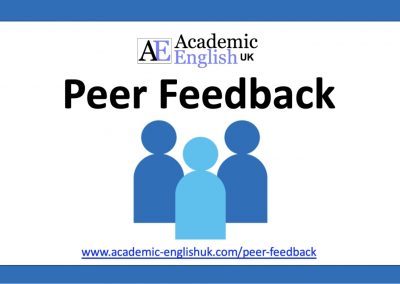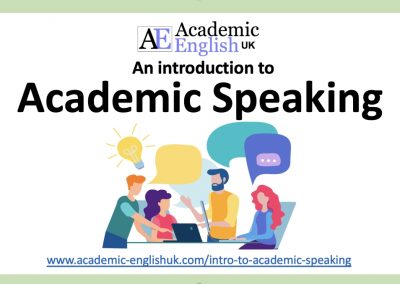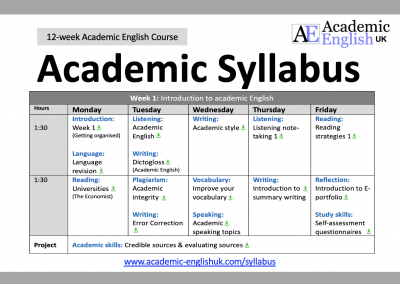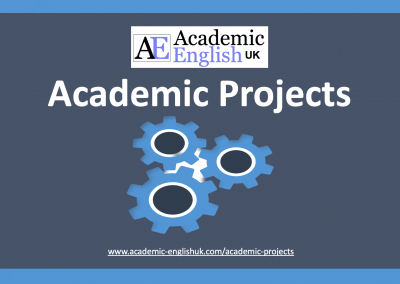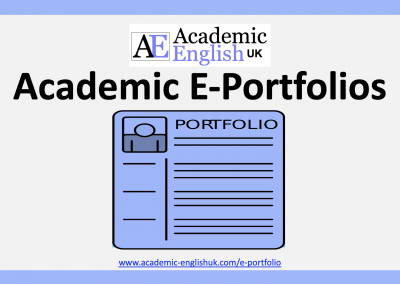Academic Syllabus
What is our academic English UK syllabus?
We’ve put together two academic English courses (6 weeks & 12 weeks) using materials from this website. The intensive course programme provides students with the necessary academic writing, reading, speaking and listening skills to prepare them for studying at university. The course is suitable for international students wishing to go on and study on both postgraduate and undergraduate courses.
These two syllabi are a detailed guide to how our materials can be used on an academic English course. Both courses progress through building a foundation of academic competence to enable students to analyse and evaluate reading & listening texts effectively. Each syllabus includes formative and summative reading, writing, speaking and listening tests, a reflective e-portfolio and project work. Level: ***** [B1/B2/C1]
- Syllabus example of the 6- week academic English course: here
- Syllabus example of the 12- week academic English course: here
Teacher’s Notes
Aim: This syllabus is a guide to how our materials can be used on a course. We have a wide selection of lessons that should be done early on in a course to build the foundation for academic competence. There are variations for the weekly syllabus so please see below on the changes and adaptions that can be made.
Class Times
3 hours a day + project.
Week 1 Introduction
Week 1 includes the basics of getting organised, language revision, and an introduction to academic English (academic style, listening & reading strategies, introduction to summary writing, etc…).
Weeks 1-11 E-Portfolio
The course includes a e-portfolio of academic learning skills which the students work on each week. The e-portfolio is great way to foster reflection and learner autonomy: e-portfolios
- Marking: E-portfolio deadline is on Monday mornings and returned on Thursday mornings.
- You can replace the e-portfolio with listening worksheets (TED Talks) or Instant Lessons.
Weeks 1-12 Project
This depends on your institution’s assessment procedure. We have created a range of projects that can be done for this section. Go here: projects. In the project classes we have also included academic conventions such as paraphrasing, referencing, research skills etc…If you do not have extra classes for project, then you can use Fridays for project classes and / or academic conventions lessons. Friday’s writings and the portfolio can be done for homework.
Weeks 2-3
These lessons continue to build on the key skills of academic English. E.g., AWL, critical thinking, reading strategies, summary writing, listening note-taking etc…
Weeks 4-12 Topic-based Lessons
From week 4, the reading, listening, speaking and writing become topic based. E.g., W4: Globalisation. Monday’s reading & Tuesday’s listening texts are used for the Wednesday’s speaking seminar and the Friday’s writing.
These lessons are designed to replicate university study and encourage students to think critically and synthesise. It is important for students to have time to analyse and evaluate content based around a specific topic to be able to formulate opinions and critique the authors’ ideas. You can change the reading topic to suit your students’ choice of study: Reading Tests
Fridays: Writing
It is a good idea to complete the writing in class time. This way the teacher can monitor the students while they are working and offer assistance and guidance. It also provides good evidence of the student’s natural ability of writing and prevents the use of A.I. Mark / grade writing tasks on Friday afternoons and return on the following Monday morning. All writing should use the correction code (use 7-10 correction code symbols and one ‘positive’ and one ‘to improve’ comment).
Weeks 6 & 12 Tutorials and Assessment
These weeks have been assigned to tutorials and assessment. Assessment is a reading test, reading to writing summary, listening test and a seminar speaking test. Use the marking criteria: here
*Additional notes
There are additional notes on the timetable that help guide the content of classes.
12-Week Academic Syllabus (new 2023)
This 12-week syllabus is a guide to how all our materials can be used on an academic English course. The course progresses through building a foundation of academic competence to enabling students to analyse and evaluate reading & listening texts effectively. The syllabus includes formative and summative tests, a reflective e-portfolio and project work. Example syllabus. Level: ***** [B1/B2/C1] INSTITUTIONAL MEMBERSHIPx
6-Week Academic Syllabus (new 2023)
This 6-week syllabus is a guide to how all our materials can be used on an academic English course. The course progresses through building a foundation of academic competence to enabling students to analyse and evaluate reading & listening texts effectively. The syllabus includes formative and summative tests, a reflective e-portfolio and project work. Example syllabus. Level: ***** [B1/B2/C1] INSTITUTIONAL MEMBERSHIPx
Syllabus Example of Week 1
Week 1: Introduction to academic English
1:30
1:30
Project
Tuesday
What's the difference between general and academic English?
X
Writing:
Academic English dictogloss
Academic integrity
X
Writing:
Error correction code and practice
Wednesday
Academic style 1
Improve my vocabulary
X
Speaking:
Academic topics
Thursday
Note-taking skills 1
Introductory to summary writing*
Friday
Reading strategies 1
Introduction to the e-portfolio*
X
Self-study:
Self-assessment questionnaires*
*W1 Additional notes:
- Thursday writing: There are three topics for the summary writing (general, business or STEM): Go here.
- Friday reflection: The introduction to e-portfolio lessons asks students to create three Academic Learning Goals (ALGs). Deadline W2 Monday.
- Homework: Self-assessment questionnaires.
Syllabus Example of W6 Formative Assessment
Week 6 Formative Assessment
1:30
1:30
Project
Tuesday
Digital Marketing Strategies
(Formative Exam*)
Seminar preparation*
Wednesday
Marketing Theories
(Formative Exam*)
Marketing Theories
(Formative Exam*)
Thursday
E-Portfolio
E-Portfolio
*
*
Marking:
Deadline for all marking is 17:00
*
Friday
Formative test results and feedback*
*
(10-minute individual tutorial)
*
Formative test results and feedback*
*
*
(10-minute individual tutorial)
*W6 Additional notes:
- W6 formative assessment: Follow the instructions on the reading, summary and listening tests for exams.
- Tuesday self-study lesson: Students have the second lesson to prepare for the seminar. Students are only given the video link / MP4 and their notes from the listening test NOT the listening test questions.
- Wednesday’s seminars: Follow the instructions in the seminar speaking lesson. Students work together in groups of 4-6. Teachers provide a set of questions. Students discuss for 25-30 minutes (approx. 5 mins per person). Students summarise the key points in the last 5 mins. Students CAN refer to their texts and notes. Use the seminar criteria: go here
- Thursday self-study lesson: Students work on their e-portfolios while teacher marks the formative summary writing tests.
- Friday tutorials: Students are given their formative exam results & feedback before the start of class. Each student is given a 10-minute individual tutorial that focuses on their results and teacher feedback.
- Project tutorials (Monday -Thursday): Each student is given a 15-minute individual tutorial that focuses on their progress so far.
Teacher marking:
- Mark reading tests.
- Mark listening tests.
- Grade the seminars live.
- Mark the summary writing tests.
- Marking deadline for all assessments W6 Thursday 17:00.
Syllabus Download
12-Week Academic Syllabus (new 2023)
This 12-week syllabus is a guide to how our materials can be used on an academic English course. The course progresses through building a foundation of academic competence to enabling students to analyse and evaluate reading & listening texts effectively. The syllabus includes formative and summative tests, a reflective e-portfolio and project work. Example syllabus. Level: ***** [B1/B2/C1] TEACHER MEMBERSHIP / INSTITUTIONAL MEMBERSHIP
6-Week Academic Syllabus (new 2023)
This 6-week syllabus is a guide to how our materials can be used on an academic English course. The course progresses through building a foundation of academic competence to enabling students to analyse and evaluate reading & listening texts effectively. The syllabus includes formative and summative tests, a reflective e-portfolio and project work. Example syllabus. Level: ***** [B1/B2/C1] TEACHER MEMBERSHIP / INSTITUTIONAL MEMBERSHIP
Writing Criteria
Essay writing criteria x 2 (updated 2023)
There are two writing criterion in this download. One is a basic marking criteria that can be used to mark students’ general writing and the other criteria includes the use of sources. They are divided into three sections of Task (40%) / Organisation (30%) / Language (30%) and have five grade levels A-F. It is a word document so you can add or change any of the rubric to suit your writing test. Example Level: ***** [B1/B2/C1] TEACHER MEMBERSHIP / INSTITUTIONAL MEMBERSHIP
*
Poster Writing Criteria
Poster writing criteria (new 2023)
This poster criteria is similar to the essay writing criteria but includes the use of images. It is divided into three sections of Task (40%) / Organisation (30%) / Language (30%) and have five grade levels A-F. It is a word document so you can add or change any of the rubric to suit your writing test. Example Level: ***** [B1/B2/C1] TEACHER MEMBERSHIP / INSTITUTIONAL MEMBERSHIP
*
Seminar Criteria
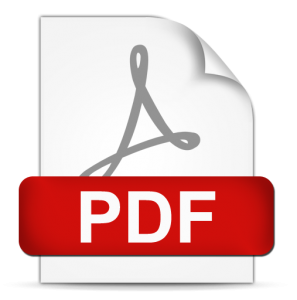 Seminar speaking criteria x 2 (updated 2023)
Seminar speaking criteria x 2 (updated 2023)
This includes one basic seminar speaking criteria to assess seminar speaking skills and contains four key criteria: Language Accuracy (20%), Language Range (20%), Pronunciation (20%) & Communicative Effectiveness (40%), and one seminar criteria that includes ‘reference to materials’. Example Level: ***** [B1/B2/C1] TEACHER MEMBERSHIP / INSTITUTIONAL MEMBERSHIP
Presentation Criteria
Presentation speaking criteria (updated 2023)
This is a basic criteria to assess & grade presentation speaking skills. It has three key criteria: Language Accuracy & Language Range (25%), Fluency & Pronunciation (25%) and Presentation & Engagement (50%). Example Level: ***** [B1/B2/C1] TEACHER MEMBERSHIP / INSTITUTIONAL MEMBERSHIP
E-Portfolio Presentation Criteria
E-portfolio presentation speaking criteria (new 2023)
This is a marking criteria to assess & grade the e-portfolio presentation speaking skills. It has four key criteria: Task Fulfilment & Content (40%), Language Accuracy & Language Range (20%), Fluency & Pronunciation(20%) and Presentation & Engagement (20%). Example Level: ***** [B1/B2/C1] TEACHER MEMBERSHIP / INSTITUTIONAL MEMBERSHIP
Poster Downloads
Poster blog page link
Academic Posters
Academic Posters 1: An Introduction (new 2023)
This lesson is designed to help students to understand what an academic poster is and what the features of an academic poster are. It contains a range of exercises to help them as well as an activity where they analyse a first draft poster for things to improve and a final draft poster for its strengths and weaknesses. The students then create their own posters using a given topic and template. Example. Level: ***** [B1/B2/C1] / PPT Slides (link in paid download) TEACHER MEMBERSHIP / INSTITUTIONAL MEMBERSHIP
Academic Posters 2: Academic Poster Guidelines (new 2023)
This lesson provides a detailed set of guidelines to create an academic poster. It includes a first draft scientific poster with 10 mistakes and a final draft for comparison. The students can then create an academic poster based on these guidelines. Example. Level: ***** [B1/B2/C1] / Video / PPT Slides (link in paid download) / TEACHER MEMBERSHIP / INSTITUTIONAL MEMBERSHIP
E-Portfolios Downloads
E-Portfolios blog page link
Academic E-Portfolios
Academic E-Portfolios (new 2023)
This lesson is designed to help students create an academic e-portfolio. It contains a range of exercises to help them understand what it is, why it is used, what makes an effective goal, how to show evidence of learning and how to reflect and evaluate. It includes a template the students can use to start creating their own e-portfolios. Example. Level: ***** [B1/B2/C1] TEACHER MEMBERSHIP / INSTITUTIONAL MEMBERSHIP

